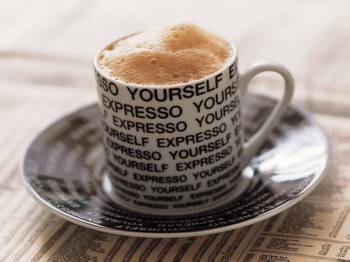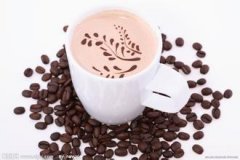What are the ingredients in black coffee?

Caffeine: Caffeine is the most noticeable of all coffee ingredients. It belongs to a kind of plant xanthine (animal muscle component). Its nature is the same as theobromine contained in cocoa. The theophylline contained in green tea is the same. After baking, the percentage of reduction is extremely small. The effect of caffeine is extremely extensive, which will affect various parts of the human brain, heart, blood vessels, gastrointestinal tract, muscles and kidneys. An appropriate amount of caffeine will stimulate the cerebral cortex, promote sensory judgment, memory and emotional activities, make the myocardial function more active, expand blood vessels and enhance blood circulation. And improve metabolic function, caffeine can also reduce muscle fatigue, promote digestive juice secretion. In addition to this, because it also promotes kidney function to help the body expel excess sodium ions (chemical components that hinder water molecule metabolism), caffeine will not accumulate in the body like other narcotic and excitatory substances (narcotic drugs, paint solvents, stimulants, etc.), and will be excreted in about two hours. Coffee flavor in the largest special roasted bitterness, is caused by caffeine.
Tannin acid: After extraction, tannic acid will become a pale yellow powder, which is easy to blend into water. After boiling, it will decompose and produce Jiao Wu acid, which will make the coffee taste worse. If brewed well and put it on for several hours, the coffee color will become thicker than just soaked, and it will not taste enough. Therefore, it is best to drink it as soon as possible.
Fat: Coffee contains fat, which plays an extremely important role in flavor. Analysis shows that coffee contains fat divided into many kinds, and the most important of them are acidic fat and volatile fat. Acidic fat refers to fat containing acid. Its strength will vary according to different types of coffee. Volatile fat is the main source of coffee aroma. Roasted coffee beans contain fat which, when exposed to air, undergoes biochemical changes that make them less flavorful.
Protein: The main source of caroli is protein, and like coffee brewed by dripping, most of the protein will not dissolve out, so the nutrition obtained by coffee drinking is also limited, that is, coffee will become the reason for weight loss.
Sugar: In the absence of sugar, in addition to the bitter taste of caffeine and the sour taste of tannin, you will also feel the sweetness, which is caused by the sugar contained in the coffee itself. After roasting, most of the sugar will turn to caramel, giving the coffee its distinctive brown color.
Minerals: lime, iron, sulfur, sodium carbonate, phosphorus, chlorine, silicon, etc., due to the proportion of very little impact on the flavor of coffee is not large, combined with only a little astringency.
Coarse fiber: the fiber of raw beans will be carbonized after roasting. The caramelization of this carbon and sugar combines with each other to form the color of coffee, but the fiber turned into powder will bring a considerable degree of influence on coffee flavor. Therefore, we do not encourage the purchase of powdered coffee beans, because it is less able to taste the flavor of coffee. Coffee's aromas, color, aroma, and taste are caused by complex chemical changes that occur during the roasting process. Therefore, raw beans must undergo appropriate chemical procedures to achieve the most balanced state of its essential ingredients in order to be considered the best baked beans. Coffee aroma changes with heat, so roast time should be as short as possible, and heat control can make coffee beans produce effective chemical composition of the minimum temperature, that is, the shortest process time and heat, so that coffee beans produce the most suitable composition ratio.
Aroma: Aroma is the life of coffee quality, and it can also best express the climate, elevation, variety, refining treatment, harvest, storage, and roasting technology of the coffee production process and roasting technology. The aroma of coffee was proved to be composed of hundreds of volatile components such as acids, alcohols, aldehydes, ketones, esters, sulfur compounds, phenols and nitrogen compounds. Roughly speaking, fat, protein, and sugar are important sources of aroma, while lipid components will blend with the bitterness and sourness of coffee to form a smooth taste. Therefore, the disappearance of aroma means that the quality is poor, and the relationship between aroma and quality is extremely close.
Important Notice :
前街咖啡 FrontStreet Coffee has moved to new addredd:
FrontStreet Coffee Address: 315,Donghua East Road,GuangZhou
Tel:020 38364473
- Prev

The basic knowledge of Coffee the principle and correct use of mocha pot
Recently, when I communicated with some brown friends, I talked about the mocha pot. This friend has been in contact with coffee for a long time and has certain attainments in tasting coffee. What surprised me was that the way my friend used the mocha pot was wrong. As a result, I communicated with more than a dozen friends who had used the mocha pot and found that most of them could not use the mocha pot correctly. To investigate the reason, it is mainly spread.
- Next

What are the advantages or disadvantages of drinking coffee?
Benefits 1. Coffee contains certain nutrients. Nicotinic acid in coffee contains vitamin B, which is higher in roasted coffee beans. And there are free fatty acids, caffeine, tannic acid and so on. two。 Coffee is good for the skin. Coffee can promote metabolic function, activate digestive organs, and has a great effect on constipation. Taking a bath with coffee powder is a kind of thermotherapy, which has the effect of losing weight. 3.
Related
- Beginners will see the "Coffee pull flower" guide!
- What is the difference between ice blog purified milk and ordinary milk coffee?
- Why is the Philippines the largest producer of crops in Liberia?
- For coffee extraction, should the fine powder be retained?
- How does extracted espresso fill pressed powder? How much strength does it take to press the powder?
- How to make jasmine cold extract coffee? Is the jasmine + latte good?
- Will this little toy really make the coffee taste better? How does Lily Drip affect coffee extraction?
- Will the action of slapping the filter cup also affect coffee extraction?
- What's the difference between powder-to-water ratio and powder-to-liquid ratio?
- What is the Ethiopian local species? What does it have to do with Heirloom native species?

